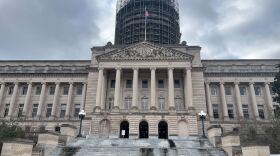Kentucky lawmakers across the political spectrum are struggling to address growing child care deserts and the high cost of early childhood education. Republican Rep. Samara Heavrin from Leitchfield says the biggest impediment to starting a child care facility isn’t cost, but local zoning laws and regulations.
Her proposed legislation would advise local governments on rules that encourage new child care centers in their communities. House Bill 561 requires the Cabinet for Economic Development to create a program that local governments can adopt to make opening and operating child care centers easier under local zoning and land use regulations.
“If we're able to remove some of the barriers that child care faces with local zoning and land use issues, then that's going to be able to create more child care centers,” Heavrin said. “That will help employers because they're going to be able to have more people back in the workforce.”
With federal COVID-19 dollars running out, a survey out of the Kentucky Center for Economic Policy found that many centers in Kentucky will likely have cut pay for their workers or raise tuition without significant assistance. One-fifth of those providers said they would have to close their door without state intervention.
Charles Aull, the executive director of the Kentucky Chamber of Commerce’s Center for Policy and Research, spoke in support of the bill and said it isn’t meant to “solve child care.”
“One of the things we’ve discovered in talking with a lot of early childhood education providers and child care service providers is that land use rules and zoning regulations can often create inadvertent barriers, oftentimes, to the availability of child care services,” Aull said.
He gave the example of someone who wants to open a child care center out of their home, which may not be zoned for commercial use. Aull said the bill would urge communities to provide more flexibility in their statutes.
Heavrin’s bill does not provide any new funding for child care in the state. It does, however, institutionalize the Employee Child Care Assistance Partnership, a pilot program created last year to match employer spending on child care with state dollars.
The program has received criticism for providing funding for people that can likely already afford child care, not those most struggling. Heavrin said those families are already receiving aid.
“We have a lot of great low-income child care assistance in Kentucky. And so this was really to help middle income families,” Heavrin said. “[Child care] can cost a mortgage payment, it can be anywhere from $6,000 to $9,000 annually. And so some families saw it was just cheaper for a parent to stay at home.”
Louisville Democratic Rep. Josie Raymond is also a co-sponsor of the bill, but said she hopes for more legislation to address the child care crisis on a higher level.
“Let's take a lot of bites of the apple, but let's also produce something that is meant to solve our child care crisis in Kentucky,” Raymond said.
In the other legislative chamber, Republican Sen. Danny Carroll from Benton has pitched a $300 million bill for early childhood education, which child care experts say would help stabilize a struggling industry. The proposed legislation has been assigned to a committee and is awaiting a hearing.
Heavrin said she hopes her bill will help more centers open in the state, but recognized that more solutions are necessary. At the same committee hearing, Heavrin also proposed to re-establish the Early Childhood Education Task Force. She said she’s not interested in “throwing money at an already broken system” and is looking for more systemic solutions.
“When I look at my caucus, there's not a big interest in doing stabilization payments and continuing the [American Rescue Plan Act] funding that came from the federal government,” she said. “Until we can have a conversation that just doesn't throw money at a problem, I don't know that it's going to change.”
Several members of the Republican party have expressed concerns that any attempts to stabilize or improve the child care system in the state would constitute government overreach.
Rep. Shane Baker from Somerset said he wanted to caution the House Families and Children Committee, not to overstep their bounds with child care.
“There's nothing in the Constitution that says that we should be involved in a number of things that we try to push into,” Baker said.
Other members, especially among the Northern Kentucky wing of the Republican party have expressed concerns with supporting child care access in the state. GOP Rep. Felicia Rabourn from Pendleton posted online that child care funding was one of her primary reasons she could not vote in favor of the House’s budget proposal this year.
“While this budget had alot [sic] of good in it, there were things I could not support,” Rabourn posted. “This bill increased state spending on child care by $52 million. This is not the proper role of government.”
State government and politics reporting is supported in part by the Corporation for Public Broadcasting.






